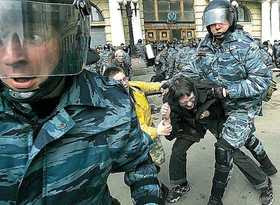Planet of the Pig-Men
Before I could think of how I would reply to that statement, Mr. Gaither then went on to say, “Mr. Dodd, all of us who have a hand in the making of policies here, have had experience operating under directives, the substance of which is, that we use our grant-making power so as to alter life in the United States that it can be comfortably merged with the Soviet Union.”
Norman Dodd, staff director of the congressional “Reece Committee” to Investigate Tax-Exempt Foundations, recalling his 1954 conversation with Ford Foundation President Rowan Gaither
“We can honestly say that our two nations have more in common than ever before.”
Then-FBI Director Louis Freeh, speaking in Moscow on July 4, 1994, after signing a cooperation pact with the FSB – the successor to the Soviet KGB. FSB Director Sergei Stepashin, incidentally, marked the occasion by proclaiming: “Together, we’re invincible.”
If we “won” the Cold War, why is our society beginning to resemble “post-Soviet” Russia?
Recently in Moscow, Russia’s OMON Special Forces police, which is sort of a national SWAT unit frequently deployed to the battlefront in Chechnya, put on an exhibition of its hardware and tactics, which include sophisticated bone-breaking techniques.
OMON has recently received the mission of dealing with “riot control,” and its lead-handed tactics in dealing with peaceful political dissidents have earned some negative press. So the exhibition served the dual purpose of PR work and intimidation.
“This is a warning,” OMON colonel Vladimir Antonovich explained. “We want to show off what we can do.”
Political dissidents in Russia are painfully aware of what the OMON police can do; many of them were on the receiving end of the unit’s brutal tactics during a recent anti-Putin demonstration in St. Petersburg. Hundreds were arrested and detained, and probably at least as many were beaten, kicked, and otherwise assaulted by OMON troops dressed in riot gear.
That’s how things are in Russia – and measured in historic terms, this type of treatment represents a dramatic net improvement over past performance.
The trend-line in the United States, however, has run in the opposite direction.
Witness the ongoing and rapid militarization of law enforcement through the Department of Homeland Security, a trend often described here that has finally caught the attention of the “mainstream” media:
“With scores of police agencies large and small, from Lexington, Ky., to Austin, Texas, buying armored vehicles at Homeland Security expense, some criminal justice experts warn that their use in fighting everyday crime could do more harm than good and represents a post-9/11, militaristic turn away from the more cooperative community-policing approach promoted in the 1990s…. Law enforcement agencies say the growing use of the vehicles, a practice that also has its defenders in the academic field of criminal justice, helps ensure police have the tools they need to deal with hostage situations, heavy gunfire and acts of terrorism. But police are also putting the equipment to more routine use, such as the delivering to warrants to suspects believed to be armed.”
The funny thing is that OMON also invokes “hostage situations” and “terrorism” to justify its approach as well.
So what we’re seeing is the mellowing of the regime governing “post-Soviet” Russia, from unalloyed totalitarianism into a superficially democratic form of authoritarian despotism, while the United States mutates from a republic into a quasi-Soviet corporatist police state.
The pigs and farmers have become indistinguishable from each other. And the two nations they rule are being plundered by them in remarkably similar ways.
By 1991, Russia scholar Anne Williamson recently told me, “No one [in the Soviet ruling elite] any longer believed the ideology, and certainly the nation was mismanaged under it, and approaching insolvency. (Sound familiar?) But Russia did not have a vibrant economy (it’s functioning economy was “hidden,” and that bit was relatively vibrant) to protect – but it did and does have tremendous national assets, and an industrial base. Naturally those assets were the object of the `privatization.’ However, you can’t pull a stunt like that in the US as presently structured…so this indirect route [buying up `public assets’ through foreign intermediaries] is a good one for them, very clever. Nonetheless, both methods do/did involve the purchase of PUBLIC assets.”
The use of foreign entities to strip-mine the United States “is brilliant beyond the pragmatic logistics of the deals,” Williamson continues, because “it will get the public accustomed to foreign ownership of large, publicly-utilized assets, so when the Chinese and the Russians start using those portions of their large reserves they have set aside for multi-100 billion dollar investment funds (not for buying US T-Bills), the public will more readily accept foreign ownership of US private and public assets.”
“Both situations involve the sale of public assets to well-connected insiders using all the levers of the state to tilt the results into the correct pockets,” she concludes. “Looks comparable to me, but the structure of each nation simply required different approaches. Russia’s effort was raw, brutal, violent and highly-visible post-collapse…the US’s is sneaky, incomprehensible to the average man, and therefore well-hidden, and set in motion pre-collapse.”
The route we’re taking may be a little different, but we’re going to end up pretty much exactly where Russia is right now: Ruled by an entrenched nomenklatura defended by a brutal military/security establishment, with our wealth controlled by a corrupt trans-national elite.
Which seems to be exactly what Norman Dodd was warning about a half-century ago.
Some perfectly sober and respectable people don’t find Norman Dodd’s testimony to be credible; they believe that the political gene-splicing that has made interchangeable pig-men out of the American and Russian ruling elites is a result of evolution, not conspiracy — that is, malevolent intelligent design. I don’t agree, but I do respect that opinion – as long as it is held by people who admit the reality of what’s happening to us.
So, to revisit the question posed above about “winning” the Cold War”:
Who won the Cold War? The Pig-Men did.
Make sure to check out The Right Source!
Content retrieved from: http://freedominourtime.blogspot.com/2007/05/planet-of-pig-men_11.html.





























